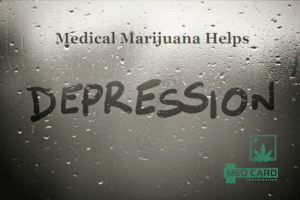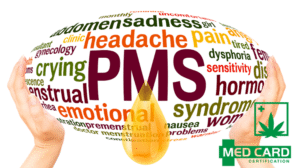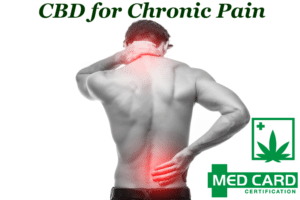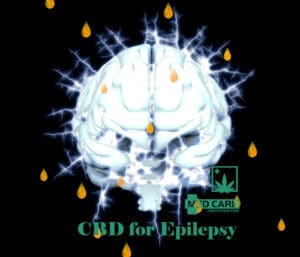
Medical Marijuana for Menopause Symptoms Treatment
Can medical marijuana be effective at relieving the symptoms of menopause?
The list of the common symptoms and using medical marijuana to effectively treat them.
How to get a medical marijuana card for menopause symptoms.
Question: Can medical marijuana be used to treat menopause?
Menopause. It’s just simply unavoidable. Although some women seem to cruise through their menopause years, others are not so fortunate. We suffer from debilitating hot flashes, sleeplessness, moodiness, a drop in libido, and even osteoporosis.
Can medical marijuana be used safely and effectively to provide some relief for the symptoms of menopause and improve the quality of life of menopausal women?
There are both scientific data and anecdotal evidence to suggest that almost all the symptoms of menopause actually respond well to cannabis — both marijuana and hemp-derived CBD oil. Furthermore, marijuana and CBD have been proven to be far safer than traditional treatments.
A bit about menopause
What is menopause?
If you’re a woman, then you almost certainly know that menopause is the period in a woman’s life when the menstrual cycle has stopped. The official signal for menopause is marked by 12 months since the last menstruation period.
Unfortunately, along with saying good riddance to PMS, menopause also comes with a decline in reproductive hormones. This, in turn, can result in a variety of unpleasant symptoms.
Menopause occurs generally after age 40. However, the typical age range is between 45 – 52.
What are the symptoms of menopause?
Two common symptoms of menopause are hot flashes and vaginal dryness. There may also be sleep disturbances. And the combination of these symptoms can cause anxiety or depression.
The full list of symptoms of menopause includes the following:
- Vaginal dryness
- Hot flashes
- Night sweats
- Chills
- Sleep problems
- Moodiness
- Weight gain
- Thinning hair
- Dry skin
- Osteoperosis (brittle bones)
- Loss of breast fullness
How is menopause traditionally treated?
There is no cure for menopause. It is a natural process. Treatments focus on symptomatic relief.
Vaginal dryness is typically treated with topical lubricants or estrogens. Medications can reduce the severity and frequency of hot flashes. And in special circumstances, oral hormone therapy may be used.
Hormone Replacement Therapy (HRT) has produced positive results. Also, for those not wishing to stray too far from natural remedies, bio-identical hormones are available.
Many doctors will not prescribe hormones to menopausal women with a history or genetic markers for various types of cancer. This is due to the fact that higher levels of estrogen can increase the risk of developing cancer. Moreover, both treatments are extremely expensive.
There are also pharmaceuticals that can help with individual symptoms. However, keep in mind that prescription drugs often come with a host of side effects that can sometimes result in permanent damage to the body.
Now, how does medical marijuana treat the symptoms of menopause?
More research needs to be done to determine the efficacy of medical marijuana in treating menopause. However, many women going through menopause find that medical marijuana can provide relief from at least some of the symptoms.
Compounds known as phytocannabinoids produced in the female flowers of the cannabis plant — specifically, THC and CBD — are similar to compounds produced naturally by the human body.
Cannabinoids produced by the brain and the nervous system are referred to as endocannabinoids. Endocannabinoids interact with receptors on the surface of cells throughout the body as well as all major organs.
There are two types of cannabinoid receptors named CB1 and CB2. CB1 receptors are found in the brain, and CB2 receptors are found throughout the body.
This system of neurotransmitters and receptors is referred to as the endocannabinoid system, or ECS.
The ECS is responsible for regulating bodily functions such as mood, appetite, sleep, pain sensation, and much more.
Marijuana for treating insomnia
Insomnia is a big problem for many menopausal women. Sleeplessness can produce a range of other problems including fatigue, brain fog, and weight gain. Hot flashes, anxiety, and pain are the main culprits in menopausal sleep disturbances.
Thankfully, marijuana has been shown to be quite effective as a sleep aid. Cannabinoids have been shown to help regulate body temperature, relax the body, reduce anxiety, and promote deeper sleep.
Marijuana also reduces obstructive sleep apnea, another common symptom of menopause.
Medical marijuana for vaginal dryness
Menopause is often marked by a sharp decrease in libido along with vaginal dryness. As women enter the menopausal stage the lining of the vagina receives less blood flow due to lack of estrogen.
THC in cannabis has been known to increase touch sensitivity and sensuality, which can lead to more lubrication in the vagina. Furthermore, CBD has been shown to produce anti-inflammatory effects and to induce relaxation of the muscles and increases blood flow.
CBD also has a similar effect to NSAIDS (ibuprofen) in regulating the activity of pain-producing nerve receptors.
marijuana for osteoporosis
Osteoporosis is a disease of the bones that results in bone loss or overgrowth. This in turn can result in brittle bones that are more susceptible to fractures.
Due to the severe hormonal shifts that take during menopause, women are far more prone to develop osteoporosis than men.
For some women, medical marijuana might be an option for treating this insidious condition.
Research funded by the Arthritis Research Campaign tested compounds similar to those in cannabis. Their research showed that bone loss decreased significantly in older mice treated with cannabinoids-like compounds.
Another study titled “The Endocannabinoid/Endovanilloid System in Bone: From Osteoporosis to Osteosarcoma” indicated that the endocannabinoid system directly supports osteoclast and osteoblasts, the cells that make up our bone structure.
Medical marijuana for treating depression/anxiety
Menopause can wreak havoc on mental health due to the hormonal fluctuations and accompanying insomnia. Depression and anxiety are commonplace amongst women going through this difficult stage.
Women are 60 percent more inclined than men to experience anxiety issues. Fortunately, however, women also experience a significantly greater reduction in symptoms of anxiety than men when using cannabis.
Researchers from Washington State University recently made headlines by showing that cannabis significantly reduced ratings of depression, anxiety, and stress. Overall, in all the tracked sessions, anxiety was reduced in 93.5 percent of cases.
The researchers also showed that low THC/high CBD marijuana gave the best results for reducing perceived symptoms of depression. And for reducing perceived symptoms of stress/anxiety, high THC products showed the best results.
Medical marijuana for treating hot flashes
Hot flashes can happen at the most inopportune times and are the biggest stealers of sleep in menopausal women. The sudden heat surges can cause profuse sweating.
Hot flashes originate in the hypothalamus, which regulates temperature, and controls blood vessel dilation and sweat response. Supplementing the body with THC has been shown to lower body temperature by imitating an endocannabinoid called anandamide which plays a role in regulating the hypothalamus.
There is anecdotal evidence suggesting that the higher the dose of THC, the lower the body temperature. However, keep in mind that higher doses of THC can also result in feelings of paranoia and anxiety, so patients should start with small doses and work their way up.
Marijuana for menopause, the conclusion
How to use medical marijuana to treat menopause
In terms of delivery methods, there are many options available to medical marijuana patients. Some of these include:
- Dried flower for smoking or cooking
- Vaporizer oils
- Tinctures
- Topicals
- Transdermal Patches
- Edibles
Furthermore, there are a variety of strains of marijuana, each with its own particular set of effects, as well as products infused with purified cannabinoids.
Marijuana can be purchased at a state-licensed dispensary. Be sure to talk to your doctor as well as your budtender about recommended consumption methods and strains.
It’s wise to experiment with various formulas for ultimate efficacy and the least unwanted side effects.
Some of the potential side effects include feelings of intoxication, dizziness or lightheadedness, dry eyes and mouth, reduced reaction time, sluggishness, and reduced short term memory. If you experience severe side effects you need to drastically cut back on your dosage. Again, start small and work your way up.
Can CBD Help Treat Menopause Symptoms
Also, you can opt to use hemp-derived CBD products that do not contain THC and are available for purchase in stores and online.
Furthermore, if you are using a cannabis-infused product to treat vaginal dryness be sure to use a product developed specifically for this purpose.
Healthcare practitioners in this field will work with you to determine the best protocol for your particular symptoms.

Sign Up for Medical Cannabis Today!
For potential patients, if you’re ready, we make it easy to connect with a medical marijuana doctor nearby or online. If you are interested in getting certified, please fill out the MMJ patient registration form below and press submit to get started. See if you qualify today!

MedCard Registration Form

Links and resources:
- Oxford Academic: Pharmacotherapy of Apnea by Cannabimimetic Enhancement
- PACE Clinical Trial: Effects of Dronabinol in Obstructive Sleep Apnea
- Chemistry & Biodiversity: Cannabis, Pain, and Sleep: Lessons from Therapeutic Clinical Trials of Sativex, a Cannabis-Based Medicine
- The Endocannabinoid/Endovanilloid System in Bone: From Osteoporosis to Osteosarcoma















